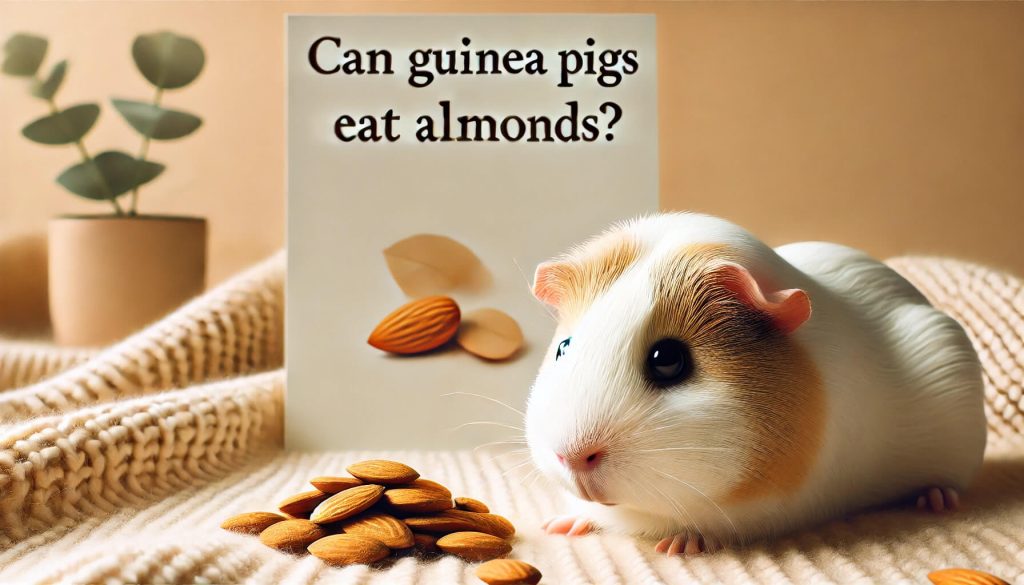
Can Guinea Pigs Eat Almonds?
Understanding Guinea Pig Diets
Understanding your guinea pig’s diet is crucial to keeping them healthy and happy. Their dietary needs differ significantly from those of other pets.
What Do Guinea Pigs Normally Eat?
Guinea pigs normally eat hay, fresh vegetables, and specially formulated pellets. Timothy hay serves as their primary food source, providing essential fiber for digestion and dental health. High-quality pellets, often fortified with vitamin C, supply necessary nutrients but should be offered in moderation. Fresh vegetables such as bell peppers, leafy greens, and carrots provide essential vitamins and minerals. Always avoid foods high in sugar, fat, and calcium.
Special Dietary Considerations for Guinea Pigs
Guinea pigs need a consistent supply of vitamin C due to their inability to synthesize it. A lack of vitamin C leads to scurvy, a severe health issue. Include vegetables rich in vitamin C like bell peppers, kale, and broccoli in their diet. Avoid feeding iceberg lettuce and starchy vegetables like potatoes, as they offer little nutritional value and can cause digestive issues. Water should always be fresh and easily accessible.
Consistently monitor your guinea pig’s weight and health to ensure their diet meets their needs. Small changes in diet can have significant impacts, so gradual introductions of new foods are essential. Always consult your veterinarian for personalized dietary advice.
Can Guinea Pigs Eat Almonds?
Guinea pigs can’t eat almonds due to various health risks. Almonds contain several components unsuitable for guinea pigs, making them a poor dietary choice for your pet.
Nutritional Profile of Almonds
Almonds are rich in several nutrients beneficial to humans but not suitable for guinea pigs. They contain high levels of:
- Fat: Almonds have 49 grams of fat per 100 grams. Guinea pigs can’t metabolize high-fat content, leading to obesity.
- Calories: At 579 calories per 100 grams, almonds pack too much energy, causing weight gain in guinea pigs.
- Calcium: High calcium levels (248 mg per 100 grams) contribute to bladder stones in guinea pigs.
- Oxalates: Almonds contain oxalates that risk kidney stones in guinea pigs.
Potential Risks of Feeding Almonds to Guinea Pigs
Offering almonds can lead to severe health issues for guinea pigs. These include:
- Choking Hazard: Almonds pose a choking risk due to their size and hardness.
- Digestive Problems: Guinea pigs could suffer from indigestion or gastrointestinal distress from almond components.
- Toxicity: Bitter almonds contain cyanogenic glycosides. Even small amounts can be toxic.
Ensure your guinea pig’s diet remains focused on hay, vegetables, and fortified pellets. Always consult a vet before introducing new foods.
Safe Alternatives to Almonds for Guinea Pigs
Almonds pose health risks for guinea pigs, but many other foods can be safely included in their diet.
Healthy Treats for Guinea Pigs
Guinea pigs benefit from a variety of healthy treats that meet their nutritional needs. Fresh vegetables and fruits are excellent options.
- Leafy Greens: Provide romaine lettuce, kale, and cilantro in small amounts.
- Bell Peppers: Rich in vitamin C, they can be given without seeds.
- Carrots: Offer baby carrots as an occasional treat.
- Cucumber: Contains high water content and can be given in moderation.
- Apples: Ensure they are seedless and serve in thin slices.
Foods to Avoid in a Guinea Pig’s Diet
Certain foods are harmful and should never be part of a guinea pig’s diet.
- Dairy Products: Guinea pigs can’t digest lactose, so avoid cheese and milk.
- Meat: They are herbivores and can’t process animal proteins.
- Onions and Garlic: These can cause severe digestive problems.
- Chocolate: Toxic due to theobromine content.
- Iceberg Lettuce: Causes diarrhea and lacks nutritional value.
Including a variety of safe, healthy foods ensures your guinea pig remains happy and healthy.
